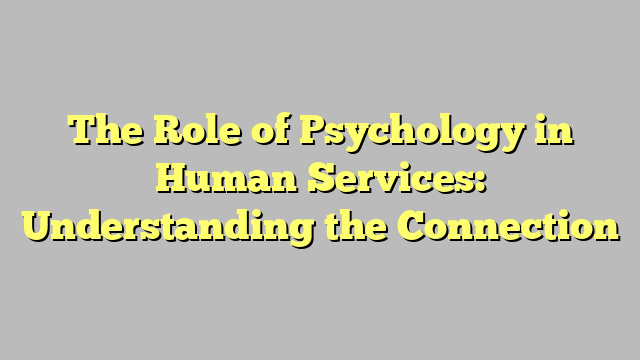The Role of Psychology in Human Services: Understanding the Connection
The Role of Psychology in Human Services: Understanding the Connection
Introduction
Psychology is the scientific study of human behavior and mental processes. It is a field that has been around for centuries and has contributed significantly to the understanding of human behavior. Human services, on the other hand, refer to a range of services that are designed to help people in need. These services include social work, counseling, and healthcare. The connection between psychology and human services is essential, as it helps professionals in these fields to understand the needs of their clients better. In this article, we will explore the role of psychology in human services and how it helps professionals to provide better services to their clients.
The Role of Psychology in Human Services
Psychology plays a crucial role in human services. It helps professionals to understand the behavior of their clients and the factors that influence their behavior. For instance, a psychologist can help a social worker to understand why a client is behaving in a particular way. They can also help the social worker to develop strategies to help the client overcome their challenges. Psychology also helps professionals to understand the needs of their clients better. For example, a psychologist can help a healthcare professional to understand the psychological factors that may be contributing to a patient’s illness.
Benefits of Psychology in Human Services
There are several benefits of psychology in human services. These include:
- Improved understanding of clients’ behavior
- Development of effective strategies to help clients overcome their challenges
- Improved communication between professionals and clients
- Improved outcomes for clients
Examples of Psychology in Human Services
There are several examples of psychology in human services. These include:
| Field | Example |
|---|---|
| Social Work | A social worker may work with a psychologist to develop strategies to help a client overcome their addiction. |
| Counseling | A counselor may use psychological techniques to help a client overcome their anxiety. |
| Healthcare | A healthcare professional may work with a psychologist to develop strategies to help a patient manage their chronic pain. |
Conclusion
In conclusion, psychology plays a crucial role in human services. It helps professionals to understand the behavior of their clients and the factors that influence their behavior. It also helps professionals to develop effective strategies to help clients overcome their challenges. The connection between psychology and human services is essential, as it helps professionals to provide better services to their clients. By understanding the role of psychology in human services, professionals can improve their practice and provide better outcomes for their clients.

